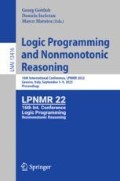Abstract
Answer set programming (ASP) has long been used for modeling and solving hard search problems. Experience shows that the performance of ASP tools on different ASP encodings of the same problem may vary greatly from instance to instance and it is rarely the case that one encoding outperforms all others. We describe a system and its implementation that given a set of encodings and a training set of instances, builds performance models for the encodings, predicts the execution time of these encodings on new instances, and uses these predictions to select an encoding for solving.
Access this chapter
Tax calculation will be finalised at checkout
Purchases are for personal use only
References
Bichler, M., Morak, M., Woltran, S.: lpopt: a rule optimization tool for answer set programming. Fund. Inform. 177(3–4), 275–296 (2020). https://doi.org/10.1007/978-3-319-63139-4_7
Brewka, G., Eiter, T., Truszczynski, M.: Answer set programming at a glance. Commun. ACM 54(12), 92–103 (2011). https://doi.org/10.1145/2043174.2043195
Dingess, M., Truszczynski, M.: Automated aggregator - rewriting with the counting aggregate. EPTCS 325, 96–109 (2020). https://doi.org/10.4204/EPTCS.325.17
Erdem, E., Gelfond, M., Leone, N.: Applications of answer set programming. AI Mag. 37(3), 53–68 (2016). https://doi.org/10.1609/aimag.v37i3.2678
Gebser, M., Kaminski, R., Kaufmann, B., Schaub, T., Schneider, M.T., Ziller, S.: A portfolio solver for answer set programming: preliminary report. In: Delgrande, J.P., Faber, W. (eds.) LPNMR 2011. LNCS (LNAI), vol. 6645, pp. 352–357. Springer, Heidelberg (2011). https://doi.org/10.1007/978-3-642-20895-9_40
Gebser, M., Kaminski, R., König, A., Schaub, T.: Advances in gringo series 3. In: Delgrande, J.P., Faber, W. (eds.) LPNMR 2011. LNCS (LNAI), vol. 6645, pp. 345–351. Springer, Heidelberg (2011). https://doi.org/10.1007/978-3-642-20895-9_39
Gebser, M., Kaufmann, B., Schaub, T.: Conflict-driven answer set solving: from theory to practice. Artif. Intell. 187, 52–89 (2012)
Gebser, M., Maratea, M., Ricca, F.: The sixth answer set programming competition. J. Artif. Intell. Res. 60, 41–95 (2017)
Gebser, M., Maratea, M., Ricca, F.: The seventh answer set programming competition: design and results. Theory Pract. Logic Program. 20(2), 176–204 (2020). https://doi.org/10.1017/S1471068419000061
Gomes, C.P., Selman, B.: Algorithm portfolios. Artif. Intell. 126(1–2), 43–62 (2001). https://doi.org/10.1016/S0004-3702(00)00081-3
Guyon, I., Elisseeff, A.: An introduction to variable and feature selection. J. Mach. Learn. Res. 3(Mar), 1157–1182 (2003)
Hippen, N., Lierler, Y.: Automatic program rewriting in non-ground answer set programs. In: Alferes, J.J., Johansson, M. (eds.) PADL 2019. LNCS, vol. 11372, pp. 19–36. Springer, Cham (2019). https://doi.org/10.1007/978-3-030-05998-9_2
Ho, T.K.: Random decision forests. In: Proceedings of 3rd International Conference on Document Analysis and Recognition, vol. 1, pp. 278–282. IEEE (1995)
Hoos, H., Kaminski, R., Schaub, T., Schneider, M.: aspeed: ASP-based solver scheduling. In: Technical Communications of the 28th International Conference on Logic Programming (ICLP 2012). Schloss Dagstuhl-Leibniz-Zentrum fuer Informatik (2012)
Hoos, H., Lindauer, M., Schaub, T.: claspfolio 2: advances in algorithm selection for answer set programming. Theory Pract. Logic Program. 14(4–5), 569–585 (2014)
Kohavi, R.: A study of cross-validation and bootstrap for accuracy estimation and model selection. IJCAI vol. 14, pp. 1137–1145 (1995)
Liu, L., Truszczynski, M.: Encoding selection for solving Hamiltonian cycle problems with ASP. EPTCS 306, 302–308 (2019). https://doi.org/10.4204/EPTCS.306.35
Mastria, E., Zangari, J., Perri, S., Calimeri, F.: A machine learning guided rewriting approach for asp logic programs. EPTCS 325, 261–267 (2020). https://doi.org/10.4204/EPTCS.325.31
Rice, J.R.: The algorithm selection problem. Adv. Comput. 15, 65–118 (1976). https://doi.org/10.1016/S0065-2458(08)60520-3
Selman, B., Levesque, D.G.M.H.J.: Generating hard satisfiability problems. Artif. Intell. 81(1–2), 17–29 (1996)
Wu, X., et al.: Top 10 algorithms in data mining. Knowl. Inf. Syst. 14(1), 1–37 (2008)
Acknowledgments
The authors acknowledge the support of the NSF grant IIS 1707371.
Author information
Authors and Affiliations
Corresponding author
Editor information
Editors and Affiliations
Rights and permissions
Copyright information
© 2022 The Author(s), under exclusive license to Springer Nature Switzerland AG
About this paper
Cite this paper
Liu, L., Truszczynski, M., Lierler, Y. (2022). A Machine Learning System to Improve the Performance of ASP Solving Based on Encoding Selection. In: Gottlob, G., Inclezan, D., Maratea, M. (eds) Logic Programming and Nonmonotonic Reasoning. LPNMR 2022. Lecture Notes in Computer Science(), vol 13416. Springer, Cham. https://doi.org/10.1007/978-3-031-15707-3_32
Download citation
DOI: https://doi.org/10.1007/978-3-031-15707-3_32
Published:
Publisher Name: Springer, Cham
Print ISBN: 978-3-031-15706-6
Online ISBN: 978-3-031-15707-3
eBook Packages: Computer ScienceComputer Science (R0)

